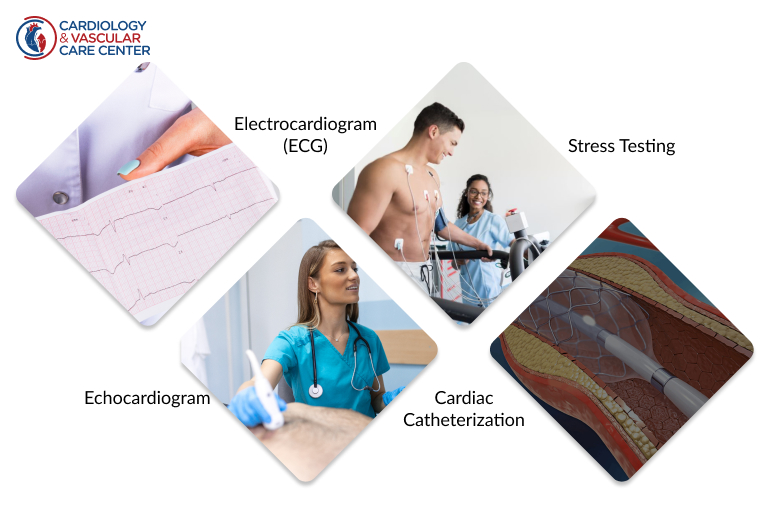Cardiology, the study of the heart and its functions, has witnessed remarkable advancements in diagnostic services over the years. In this article, we delve into the evolution, key tools, challenges, and the pivotal role these diagnostics play in shaping the landscape of cardiology. Let’s explore why understanding the intricacies of diagnostic services is crucial for both healthcare professionals and individuals seeking to maintain a healthy heart.
Evolution of Diagnostic Services in Cardiology
Cardiology diagnostics have come a long way since their inception. Initially relying on basic physical examinations, the field has embraced cutting-edge technologies. From the invention of the electrocardiogram (ECG) to the integration of artificial intelligence, the evolution of diagnostic services has significantly contributed to our understanding of cardiac health.

Key Diagnostic Tools in Cardiology
Electrocardiogram (ECG): Often the first line of defense, ECG records the heart’s electrical activity, aiding in the detection of irregularities.
Echocardiogram: This non-invasive imaging technique uses sound waves to create a visual representation of the heart, allowing for a detailed examination of its structure and function.
Stress Testing: Evaluating the heart’s response to exertion helps uncover hidden issues that may not manifest during rest.
Cardiac Catheterization: A more invasive but highly informative procedure involving the insertion of a catheter to assess blood flow and identify potential blockages.

Role of Imaging in Cardiology Diagnostics
Visualizing the heart’s structures is crucial for accurate diagnosis. Non-invasive imaging techniques, such as echocardiography and magnetic resonance imaging (MRI), provide detailed insights without the need for surgical intervention. These technologies not only enhance diagnostic accuracy but also contribute to patient comfort and safety.
Biomarkers in Cardiology
Biomarkers, measurable indicators of biological processes, play a vital role in cardiology diagnostics. Commonly used biomarkers, such as troponin and B-type natriuretic peptide (BNP), help identify cardiac issues and guide treatment decisions. Understanding these markers is essential for healthcare professionals aiming to interpret diagnostic results effectively.
Diagnostic Challenges in Cardiology
Despite advancements, diagnosing cardiac conditions can be challenging due to the ambiguity of symptoms. Chest pain, shortness of breath, and fatigue can indicate various cardiac issues, emphasizing the need for comprehensive testing. Addressing these challenges requires a multidimensional approach, incorporating both traditional and innovative diagnostic methods.
Preventive Cardiology and Diagnostics
Early detection through diagnostic services is a cornerstone of preventive cardiology. Identifying risk factors and subtle abnormalities allows for timely interventions, significantly impacting patient outcomes. Routine check-ups and screenings are invaluable tools in the prevention of heart-related illnesses.
Integrated Approaches in Cardiac Diagnostics
Collaboration between clinicians and diagnostic experts is essential for comprehensive patient care. Integrated approaches, combining data from various diagnostic tools, provide a holistic understanding of a patient’s cardiac health. Tailoring diagnostic plans to individual needs ensures a personalized and effective approach to healthcare.
The Patient Experience in Cardiology Diagnostics
The patient’s journey through diagnostic services is a critical aspect of cardiac care. Educating individuals about the importance of diagnostics reduces anxiety and fosters active participation in their health. Clear communication from healthcare providers can transform the diagnostic process into an empowering experience.

Innovations in Cardiology Diagnostics
- Artificial Intelligence in Diagnostics: AI algorithms analyze vast datasets, improving diagnostic accuracy and efficiency.
- Wearable Technology: Continuous monitoring through devices like smartwatches enables real-time tracking of cardiac metrics, enhancing early detection capabilities.
Cardiology Diagnostics and Treatment Planning
Diagnostic results guide treatment decisions, helping healthcare professionals tailor interventions to address specific cardiac issues. From lifestyle modifications to surgical interventions, the accuracy of diagnostic services directly influences the effectiveness of treatment plans.
Cost-Efficiency in Cardiology Diagnostics
Balancing the quality and affordability of diagnostic services is crucial. Investing in early detection may incur initial costs, but it ultimately leads to long-term savings by preventing more extensive and expensive interventions. Striking this balance ensures access to high-quality diagnostics for a broader population.
Educational Initiatives in Cardiology Diagnostics
Training programs for healthcare professionals and public awareness campaigns contribute to the widespread understanding of cardiology diagnostics. Educated individuals are more likely to prioritize regular check-ups and screenings, fostering a proactive approach to heart health.
Regulatory Aspects of Cardiology Diagnostics
Stringent adherence to standards and regulations is paramount in cardiology diagnostics. Ensuring the accuracy and reliability of diagnostic tools is a shared responsibility of manufacturers, healthcare providers, and regulatory bodies. Compliance safeguards both patients and healthcare professionals.

Future Trends in Cardiology Diagnostics
The future holds exciting prospects for cardiology diagnostics. Predictive analytics leveraging big data and emerging technologies, such as virtual reality, promise to revolutionize how we approach cardiac health. Staying informed about these trends is key for healthcare professionals and individuals alike.
READ ALSO : Cardiology: An Overview of Common Heart Conditions
Conclusion
In conclusion, the importance of diagnostic services in cardiology cannot be overstated. From the evolution of diagnostic tools to the integration of innovative technologies, these services play a pivotal role in shaping the landscape of cardiac care. Understanding the intricacies of cardiology diagnostics empowers both healthcare professionals and individuals, paving the way for proactive and personalized approaches to heart health.
FAQs:
How often should I undergo cardiac screenings?
It is advisable to discuss a screening schedule with your healthcare provider based on your individual risk factors.
Are there alternatives to invasive cardiac catheterization?
Non-invasive imaging techniques like CT angiography provide alternatives for assessing blood flow and detecting blockages.
Can lifestyle changes alone address cardiac issues?
While lifestyle changes are crucial, diagnostic services help identify underlying issues that may require additional interventions.
What role does genetics play in cardiac diagnostics?
Genetic testing can provide insights into hereditary cardiac conditions, aiding in preventive measures.
Are there advancements in home-based cardiac monitoring?
Yes, wearable technology allows for continuous monitoring at home, providing real-time data for early detection of abnormalities.
